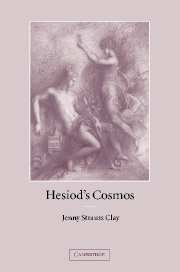Book contents
- Frontmatter
- Contents
- Preface
- Acknowledgments
- List of abbreviations
- Introduction
- 1 Orientations: the Theogony
- 2 Orientations: the Works and Days
- 3 Overtures
- 4 The origins and nature of mankind
- 5 The two Prometheuses
- 6 Perspectives on gods and men
- 7 Hybrids
- Conclusion: Hesiod and Calchas at Aulis
- Bibliography
- Indexes
6 - Perspectives on gods and men
Published online by Cambridge University Press: 04 August 2010
- Frontmatter
- Contents
- Preface
- Acknowledgments
- List of abbreviations
- Introduction
- 1 Orientations: the Theogony
- 2 Orientations: the Works and Days
- 3 Overtures
- 4 The origins and nature of mankind
- 5 The two Prometheuses
- 6 Perspectives on gods and men
- 7 Hybrids
- Conclusion: Hesiod and Calchas at Aulis
- Bibliography
- Indexes
Summary
The preceding discussions of human origins and the human condition as inscribed in the two versions of the Prometheus story have demonstrated how the two Hesiodic poems simultaneously oppose, complement, and mutually illuminate each other. A similar strategy underpins the present chapter, which examines the role of human beings in the Theogony and the role of the gods in the Works and Days. Here we are dealing not with explanatory accounts of origins, but with the present relations of gods and men that inform the consequences of those originary events. Once again, Hesiod insists that we combine these two perspectives in order to grasp his cosmos.
MEN IN THE THEOGONY
Human beings are mentioned sporadically throughout the text of the Theogony, for the most part merely in passing references such as the formula describing Zeus as “father of gods and men.” In addition, right from the beginning, Hesiod mentions Eros’ power over both gods and mortals; and, as we have seen, many of the descendants of Night are singled out as having a special – usually negative – impact on the lives of human beings. The winds that blast the sea and destroy the fields, which arise from Typhoeus’ defeat, likewise constitute a “bane to mankind” (872–80). Despite the relative scarcity of such explicit references, it is nevertheless appropriate to claim that “Hesiod's plan covers not only the divine and the physical cosmos, but also the human cosmos”.
- Type
- Chapter
- Information
- Hesiod's Cosmos , pp. 129 - 149Publisher: Cambridge University PressPrint publication year: 2003



